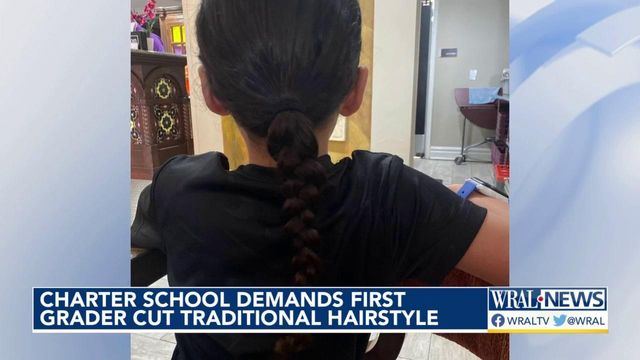School defends grooming standards, sees 'trumped up controversy' in Native American families' resistance to cut boys' hair
Classical Charter Schools of America, owners of four schools in south and east North Carolina, posted a statement online in defense of school grooming standards in response to families in Whiteville and Leland who pushed back after their sons were asked to cut their hair.
Posted — UpdatedThe school pointed to published policy which requires boys' hair to be "neatly trimmed and off the collar, above the eyebrows, not below the top of the ears or eyebrows, and not an excessive height.
"Distracting, extreme, radical, or faddish haircuts, hairstyles, and colors are not allowed. No mustaches or beards. Boys must be clean shaven," the policy reads.
But Mia Chavis, mother of 7-year-old Edward Chavis, told WRAL News that policy was not enforced when the school year began. She sees it as an affront to Edward's Native American heritage.
Last year, Edward was able to wear his long hair in a braided ponytail or in a bun on top of his head. His mother said that compromise has changed, and dozens of other families are also being impacted.
In its statement, Baker A. Mitchell, president and CEO of The Roger Bacon Academy, which manages the four CCS-A charter schools, acknowledged a recent return to the grooming policy which was relaxed during the COVID-19 pandemic.
“With normalization returning, administration has begun efforts to return to our prior levels of expectations in all areas,” Mitchell said.
Edward's grandmother, Tami Jump said, "We normally braid our children's hair when it grows longer because we believe that the braid shows strength, it shows character."
Chavis said she's talked to African-American parents who have also been asked to change their sons' hairstyles.
Ashley Lomboy, a member of the Waccamaw Sioian Tribe, said her son's hair is an extension of who he is.
“Without his hair, he will lose part of himself and a critical aspect of his heritage. Native Americans have been wearing their hair long since time immemorial," she said.
“The ACLU seems more interested in creating controversy than resolving it,” said Mitchell. The school's website says the policy applies "to students at all four of its Southeastern North Carolina charter schools regardless of their race, religion, income, cultural background, or national origins."
"At this point, it's not even a Native thing," Chavis said. "It's a human rights thing.
"They have a pledge that they say every morning, and it's even on the back of his shirt that he has to wear for PE every Thursday. The first line of that pledge is 'I pledge to keep myself healthy in body, mind, and spirit.' If I had to force him to cut his hair, it would be detrimental to his body, his mind and his spirit."
Related Topics
• Credits
Copyright 2024 by Capitol Broadcasting Company. All rights reserved. This material may not be published, broadcast, rewritten or redistributed.






